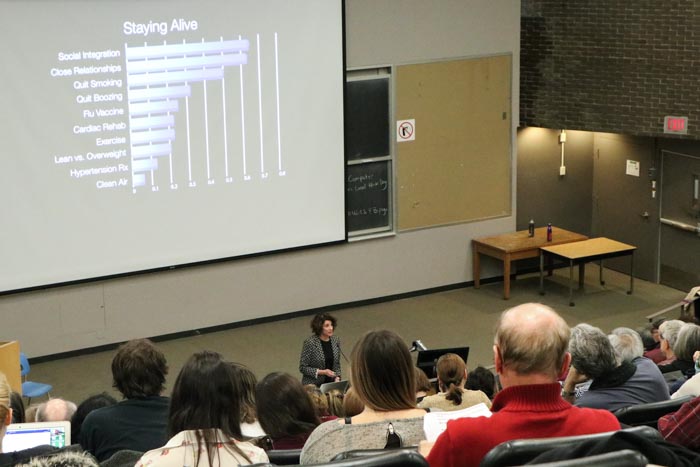On Nov. 24, McGill’s Department of Psychology hosted Canadian psychologist, journalist, and broadcaster Susan Pinker, who delivered this year’s Macnamara Lecture in McGill’s McIntyre Medical Building. Pinker spoke about her latest book, The Village Effect: How Face-to-Face Contact can Make us Healthier, in which she underlines the importance of face-to-face social contact. What she calls “the village effect” is a metaphor for the social interactions humans need to thrive and survive.
“There’s new evidence from a fairly new field, social neuroscience, that shows that the type of social contact that we all have affects our ability to remember, our resilience, and even how fast tumors grow,” Pinker said.
According to Pinker, many years of social science research shows that the number one factor on our health above getting flu vaccinations, exercising regularly, or eating healthy is our social interactions.
This research studied a whole population (40-60 thousand people) for seven years. Individuals’ features, such as their weight, age, number of children, lifestyle, number of friends and smoking habits, were recorded. At the end, the subjects ranked factors based on their effect on life expectancy: The two most important factors being social integration, followed by close relationships.
As Pinker explains, close relationships occur when people can count on one another in the case of an existential crisis, and share a closer bond with each other than anyone else. Social integration includes the casual or weak bonds, in addition to close relationships.
“[Social integration includes] the people you meet when you walk your dog, the people you say ‘hi’ to cleaning out the snow, [and] the librarian you talk to when you head out to the library,” Pinker said. Most people find these interactions useless, although they are the most important lifestyle predictors.
In her book, Pinker presents numerous other studies that reveal the importance of social interactions. For example, Pinker’s study on women with breast cancer suggests that women suffering from the illness are four times more likely to survive if they enjoy regular, face-to-face contact. Furthermore, men suffering from a stroke received more benefits from regular interaction with other men than from medication.
Pinker also addresses the modern growth of human loneliness: A quarter of the population reported that they have no one to talk to. At the same time, we live in a world where people are more connected than ever, through social media and apps like FaceTime and Skype.
Studies show, however, that digital interactions cannot replace in-person communication.
“During actual face-to-face contact, a person will release a whole series of neurotransmitters and hormones that foster trust, reduce stress, kill pain, and induce pleasure,” Pinker said.
Further brain scans show that in-person contact increases brain activity in areas linked with social intelligence and emotional reward in a way that digital contact does not. While person-to-person contact is crucial for human well-being, social media provides more opportunities for digital interactions. These technologies restrict humans from what they need: Real, human contact.
Pinker’s lecture emphasizes that all humans require social relationships. Making time to meet people in person, rather than Skyping, emailing, texting, or messaging, will benefit both parties. Take the time to appreciate even the smallest of human interactions: As insignificant as they may seem, they go a long way in increasing health, promoting well-being, and increasing life expectancy.








